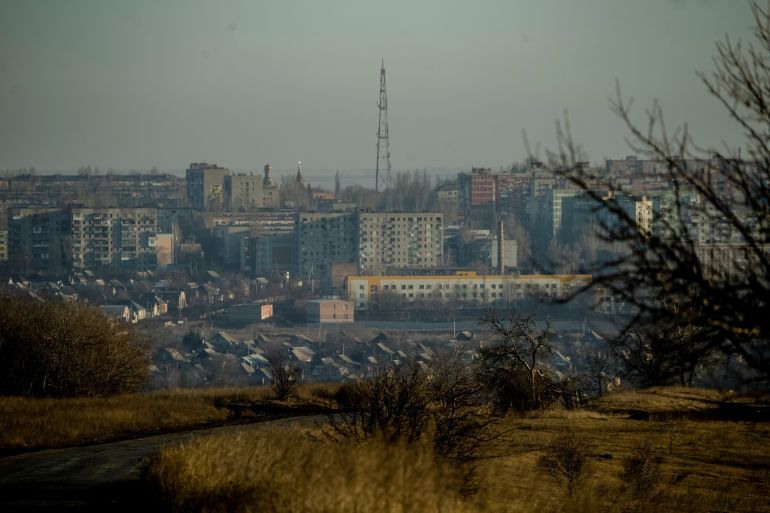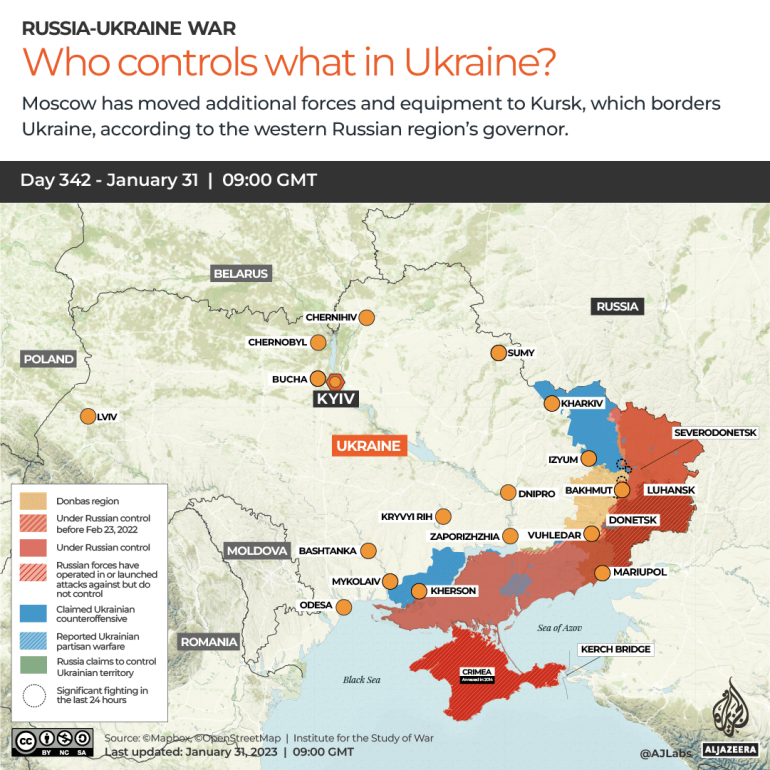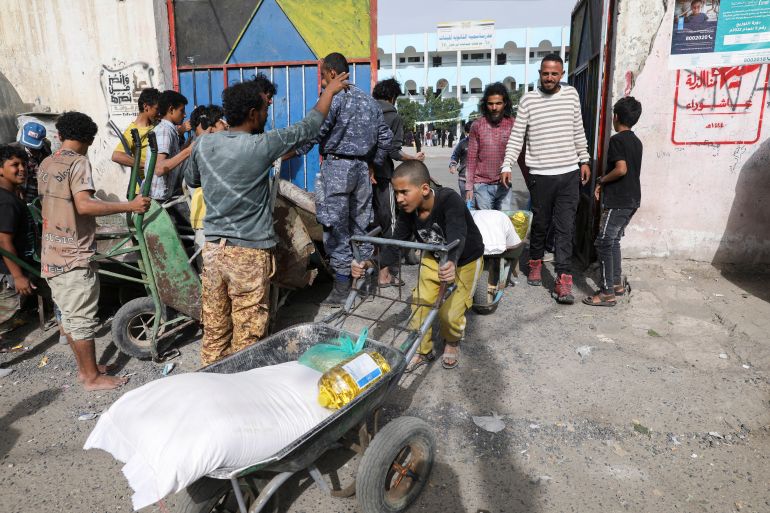Month: January 2023
Russia claims village near embattled Ukrainian city of Bakhmut

Russia says it has captured a village on the northern outskirts of Bakhmut as it intensifies efforts to surround the front-line city in Ukraine’s eastern Donetsk region.
The village of Blahodatne, which is about five kilometres (three miles) north of Bakhmut, was captured with the help of aerial support, the Russian defence ministry said in a statement on Tuesday.
There was no immediate response from Ukraine’s government, and Al Jazeera could not independently verify the account.
The announcement came three days after the head of Russia’s Wagner Group said the mercenary force had seized Blahodatne in an attack Ukraine said it had repelled.

Capturing Bakhmut, which had a pre-war population of about 75,000 people, would be Russia’s first major battleground achievement since it took the cities of Severodonetsk and Lysychansk in July.
Regional Governor Pavlo Kyrylenko said two civilians, including a boy, were killed in a Russian artillery attack on Bakhmut on Tuesday.
Russian forces have made several advances in the area in recent weeks, notably capturing the salt-mining town of Soledar to Bakhmut’s north.
Earlier this month, Russia also claimed it had captured Klishchiivka, a village in Ukraine’s Donetsk region, which had a pre-war population of about 400 people. The village sits about nine kilometres (six miles) south of Bakhmut.
This week, a large Russian force launched an assault against the Ukrainian-held bastion of Vuhledar, further south along the same eastern front. Russian officials have claimed to have gained a foothold there, but Kyiv says it has largely repelled that attack so far.
Military centres in Belarus
Meanwhile, Russian President Vladimir Putin on Tuesday backed a plan to set up joint military training centres with Belarus, reigniting speculation that forces from the neighbouring country could join his troops in Ukraine.
In a decree, Putin tasked the defence and foreign ministers to conduct talks with Belarus and sign an agreement to establish the facilities.
The document did not specify where the centres would be based. Minsk allowed Moscow to use Belarusian territory as a launching pad for its Ukraine offensive that began on February 24 last year.
For months, Belarus’s longtime leader Alexander Lukashenko has insisted that he will not send troops into Ukraine despite increasing military cooperation with Russia.

Earlier this month, the two countries launched joint air force drills in Belarus that are scheduled to last until February 1.
“Some experts say the exercises could be a diversion tactic to lure Ukrainian forces away from the frontlines in the east and south,” said Al Jazeera’s Natacha Butler, reporting from near the Ukraine-Belarus border, where Ukrainian forces have been training amid a potential threat military threat from Belarus.
“Few people here expected this war and no one pretends they know what Moscow is planning. But they are watching closely and say they are ready.”
France to send more weapons
Separately, defence minister Sebastien Lecornu said on Tuesday that France will send 12 further Caesar truck-mounted howitzers to Ukraine to help in the fight against Russia.
The artillery pieces, adding to 18 already delivered, would be financed from a 200-million-euro ($217m) fund set up by France after Russia’s invasion, Lecornu said in a joint news conference with his Ukrainian counterpart, Oleksiy Reznikov, in Paris.
Alongside other Western-supplied mobile cannon such as the German Panzerhaubitze 2000, the Caesar was credited last year with helping Ukraine attack targets deep behind Russian lines, undermining Moscow’s offensive.
The truck-mounted 155mm guns can set up, fire a highly-accurate volley at ranges of up to 40km (25 miles) and shift position before the enemy can locate them and fire back.
Lecornu said the new batch of howitzers would be delivered in the coming weeks.
Denmark has also pledged its entire existing 19-strong fleet of the French-made howitzers to the Ukrainian war effort.
SOURCE: AL JAZEERA AND NEWS AGENCIES
Sordin – MSM – ShotShow 2023
UK gov’t facing High Court battle over arms sales to Saudi Arabia

A campaign group has launched a courtroom battle against the United Kingdom’s arms sales to Saudi Arabia, warning the weapons are worsening a major humanitarian disaster in war-torn Yemen.
The United Kingdom’s High Court on Tuesday began hearing the case brought forward by the Campaign Against Arms Trade (CAAT), which says arms exports have contributed to the deaths of thousands of civilians.
The UK-based group is challenging the lawfulness of a decision taken by the British government in 2020 to continue supplying weapons to the Saudi-led coalition involved in the nine-year-old conflict in Yemen.
It marks the latest development in a long-running battle over the legality of the exports, which CAAT says have made the UK more than 23 billion pounds ($28bn) since the war began.

CAAT won a similar fight in 2019, when Court of Appeal judges said continuing to license military equipment that could be used in the war in Yemen for export was unlawful amid concerns they may have been used to commit war crimes.
The government temporarily halted sales following the ruling. UK law does not allow for the export of weapons if there is a “clear risk” they may be used to carry out war crimes.
However, exports resumed in mid-2020 under the order of then-trade minister Liz Truss after a governmental review.
The review concluded that possible violations of international humanitarian law by actors using UK-supplied weapons were only “isolated incidents”.
Governmental review under scrutiny
British arms sales to Saudi Arabia have continued in recent years, despite the UK’s leading ally, the United States adopting a partial ban on weapons exports to the kingdom because of the war in Yemen.
Meanwhile, campaigners and rights groups have disputed the validity of the governmental review’s findings.
“The ample evidence of laws of war violations by the Saudi-led coalition in Yemen throughout the war make clear that these violations are not simply ‘isolated incidents’ as claimed by the UK government,” Niku Jafarnia, Yemen and Bahrain researcher at Human Rights Watch, said.
“UK weapons have been used in some of these violations with total impunity,” Jafarnia said.
“At a time when the UK is promoting a rules-based international order, and rightly calling out Russia for serious violations of international law, it needs to apply those same rules to itself and end the sale of weapons to Saudi Arabia.”
The weapons supplied by the UK include Paveway guided bombs and Brimstone and Storm Shadow missiles.
‘UK bombs kill civilians’
Emily Apple, a spokesperson for CAAT, accused the government of “caring more about profit than war crimes”.
“The … case is being taken in solidarity with the people of Yemen who deserve justice,” Apple said.
“We cannot sit by while UK bombs kill civilians and cause devastation while UK arms dealers profit.”
The conflict in Yemen started in 2014 when Houthi rebels, backed by Iran, seized large swaths of the country, including the capital, Sanaa.
The war escalated in March 2015, when the Saudi Arabia-led coalition intervened in an attempt to restore the government of President Abd-Rabbu Mansour Hadi.
The coalition has been assisted by several Western powers, including the UK and the US.
Both sides in the conflict have since been accused of war crimes during fighting that has killed more than 8,900 people to date, according to the Yemen Data Project.
A United Nations-brokered truce deal agreed to in April of last year has largely held, despite expiring in early October.
The agreement has delivered the longest stretch of relative calm in Yemen since the war began, but both sides have stepped up moves to economically weaken the other in the interim.
SOURCE: AL JAZEERA
